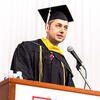Daniel James Hart
B.S. in International Business Studies and Economics, and Certificate in Political Economy
日本語版はこちら

日本語版はこちら
Thank you Dean Stronach and thanks to the faculty and staff and distinguished guests. And, of course, our friends and family who came here from all over the world to celebrate this special day with us. We couldn't have done it without your support.
Now, congratulations to everyone who is graduating today. When I recall the new student orientation back in the summer of 2014, the memory that stands out the most is the advice given by Associate Dean Kato in her closing remarks when she said—and I'm paraphrasing—"study hard, have fun, and don't go to Roppongi." Well, two out of three isn't bad. We definitely studied hard and we certainly had fun during our time at TUJ.
What impressed me most about the study habits of TUJ students, was how expertly we could leverage technology to complete difficult group projects that required intense collaboration. It was astonishing how rapidly the students in these study groups created shared workspaces in the cloud to collect and analyze data - and these are students. Online chat groups were also setup to discuss ideas and clarify concepts in real time. Remarkably, this constantly connected, cloud-based collaboration platform did not exist only ten years ago. But it felt completely natural and second-nature to us. Few of us even realized what a paradigm shift this represented.
Yet technology only complimented the traditional way of studying—it didn't replace it. The old school, face-to-face method of learning with people, books, papers, and pens was still alive and well at TUJ. The student lounges and designated study rooms were always humming with activity during school hours. The learning center still had plenty of students who preferred help from their peers as opposed to Khan Academy. Then there was the TUJ library, where you could often find me, and certainly most of you, studying before and after classes.

Now, there is something very special about the TUJ library because it's more than a physical destination for many of us. It's a mental destination. For no matter how turbulent things are out in the corridors of Azabu and Mita Halls, you could always seek solace in the library. It was truly a shelter from the storm. I still have many fond memories of studying in my favorite cubicle surrounded by books on Economics by such luminaries as Adam Smith, Ludwig Von Mises, and Friedrich Hayek. On a Spring day, the windows would be open, a gentle breeze would blow in, and the pervasive sound of traffic outside would mix with the quiet, genial whispers of our friendly, hard-working librarians. Hence, confirming that we do live in a benevolent universe, which is, I might add, a prerequisite to successful studying.
Then it's back into the lion's den of ideas. And that was where the fun began. I remember in one of my political science classes, there were some especially egregious topics that were being discussed, which is actually quite normal in political science classes. However, the professor, who was very well meaning and who came from Main Campus, proceeded to warn us that there would be "trigger words" in the discussion. I can remember my classmates looking at each other incredulously, wondering "what the heck is a trigger word?". The class continued and the controversial topics were discussed passionately, but always tactfully. Ideas that were different from our own were tolerated and debated in a mature and respectful manner. Meanwhile, on the other side of the world, at a very prestigious university in the San Francisco bay area, a riot was breaking out on campus because students could not tolerate ideas that were different from their own.
So, what does this say about us? Well, for me, it simply confirmed what I already know, which is that TUJ students are—by definition—already living outside their comfort zone. So yeah, we're pretty thick skinned. You can't be insular and at the same time be a TUJ student. That is an oxymoron. We thrive on our diversity and our differences. It doesn't matter if you're a working adult, or a veteran, or a Japanese student fresh out of high school, or a cosplay fanatic from Poughkeepsie. We all came here to learn in an environment that celebrates those differences while, at the same time, exposes us to ideas that might be considered dangerous in places like Berkeley or Cambridge.
But we can handle it. We could handle it. And now we finally arrived at the end of our journey, and many of us are probably wondering: what happens next? I know that a lot of you are still searching for your dream job. The good news is that we're currently in a relatively strong job market. I mean, seriously, if you think it's difficult finding a job in 2017, just think of those poor graduates back in 2008 who were facing the imminent collapse of the global financial system. Now THAT was a tough job market! Of course, that's not meant to trivialize or downplay the challenges that many of us will face during our job hunt. My humble advice to you, based on my own experience, is to apply to as many jobs as possible and always include a personalized cover letter because someone out there will read it and appreciate you.
Also, remember that your connections are useful in life because they can generate leads and help you get your foot in the door. But, once you're in, you will need to rely on the knowledge, the skills, and the practical wisdom that you've learned here at TUJ, and elsewhere, to be a success. You will also need to constantly upgrade your skills throughout your life and actively develop your mind. Because if you don't, you will be replaced by a robot, or some other artificial intelligence that we can't even fathom right now, but trust me, these things are right around the corner. So take them seriously and please be well prepared.
In closing, good luck to everyone in all your future endeavors, whether in Japan or elsewhere. It has been a privilige and an honor to count all of you as my classmates and my friends. I hope you will keep in touch and I hope you will continue to study hard, have fun and if I see you in Roppongi, I'll buy you a beer because you've definitely earned it.
Minnasan, omedetou Gozaimasu. Otsukaresama desu. Thank you very much.

ストロナク学長、ありがとうございます。教職員の皆さん、ご来賓の皆様、そしてもちろん、この日を祝うために世界中からお越しになった家族、友人の皆さんのおかげで、皆さんのご支援なくして、私たちはここまでたどり着くことはできなかったでしょう。
さて今日、卒業する皆さん、おめでとうございます。2014年夏学期の新入生オリエンテーションのことを思い出すと、加藤副学長が締めくくりにおっしゃっていた言葉が特に記憶に残っています。概ね次のような内容で、「よく学び、楽しみ、六本木には行かないように」。この3つの忠告のうち2つは守れたのだから、そんなに悪くはないでしょう。テンプル大学ジャパンキャンパス(TUJ)での学生生活で、私たちは懸命に勉強したし、大いに楽しんだことに間違いはないのですから。
TUJの学生たちの勉強に関する習慣で一番印象に残っているのが、テクノロジーを活用して、綿密な協力なくしては達成できない難度の高いグループプロジェクトをいかに巧みにこなしていたかということです。こうした課題に対して、各グループの学生たちは、驚くほどの速さで共有のワークプレイスをクラウド内に作成し、プロジェクトに関するデータの収集と解析を行ってみせるのです。また、オンラインチャットのグループを設定して、リアルタイムで様々なアイデアを議論してコンセプトを明確化するのです。驚くことに、常時繋がっているクラウドベースの共同作業プラットフォームは、10年前までは存在していませんでした。ですが、私たちの世代にとってこのようなテクノロジーはとても自然で何の違和感もなく扱うものなのです。私たちの世代のほとんどが、これがどんなに画期的な出来事だったかということすら知らないのです。
ですが、テクノロジーはあくまで伝統的な学び方の補助役に過ぎないのであって、それに取って代わるということはありません。人と、本と、紙と、ペンと共に学ぶ、昔ながらの人と人とのコミュニケーションに基づいた学習方法は、TUJにおいては今も健在です。学生ラウンジや自習室は開校時間に勉強をする学生たちが活発に利用しています。ラーニングセンターには今でも他の学生たちからアドバイスを受けようと多くの人が訪れています。それから、TUJの図書館のことも忘れてはいけません。私も、そして皆さんも、クラスの前後にここで学習をしたものですね。

TUJの図書館には特別な何かがあるような気がしてなりません。そこはただ単に物理的に足を運ぶ場所なのではなく、自分の精神が向かっていく場所なのです。麻布校舎や三田校舎がどれだけ騒がしくても、図書館の中にはいつでも安らぎを求めることができました。まさしくそれは、嵐から逃れるためのシェルターのような存在だったのです。私のお気に入りの席で、アダム・スミスやルートヴィヒ・フォン・ミーゼス、そしてフリードリヒ・ハイエクのような経済学の偉人たちの書いた本に囲まれてたくさん勉強したという楽しい思い出は今でも忘れられません。春になると窓が開け放たれて、そこから優しいそよ風が中に吹き込み、外から入ってくる喧噪が、フレンドリーで一生懸命に働いてくれる図書館職員の方々の、静かで優しい囁き声と混じり合ったものです。こうした環境に身を置くと、自分たちがいかに慈悲深い世界に生きているのかということが実感として湧いてきます。そして、そうした安心感が学業の成就には欠かせないのではないかと、私は思うのです。
その一方で、どんな考えも恐れずに話し合うことができるのがTUJという場所でした。ある政治学のクラスでは、とても言葉にすることのできないようなテーマについて議論していました。政治学のクラスでは至極当然の風景ではあるのですが。
その講義を受け持っていた教授はとても優れた人格を持つ、米国本校の先生で、その方が「引き金となる言葉」が議論をするときに出てくるかもしれないから気を付けなさい、とおっしゃいました。クラスメートたちがお互いの顔を不思議そうな表情で覗き込んで、「引き金となる言葉って一体何なんだ?」と疑問を抱いていた様子をよく覚えています。クラスは続き、物議を醸すような話題について皆が情熱的ながらもスムーズに議論は進んでいきました。自分たちとは違う考えも、分別と敬意をもって受け入れ、議論しました。一方、太平洋の向こう側では、サンフランシスコのベイエリアのとある名門大学にて、学生たちが自分たちとは違う他者の考えを受け入れることができなかったために、キャンパス内で暴動が起きているのです。
こうしたことから、TUJの学生たちについてどんなことがわかるでしょうか? といっても、私はもうすでにその答えを知っているのですが。つまり、TUJの学生たちはこのように定義できるのです。常に自分の心地よい安全圏から外に出て生きているのがTUJの学生たちである、と。私たちはある意味、面の皮が厚いのです。TUJの学生でありながら、自分だけの閉ざされた世界に籠っているわけにはいきません。それは矛盾というものです。私たちは、多用性と違いを受け入れながら成長していくのです。社会人であろうと、米国の退役軍人であろうと、高校を出たばかりの日本人学生であろうと、ポキプシー出身のコスプレマニアであろうと、あなたが何であろうと構わないのです。私たちがここに来た理由は、そうした互いの違いを祝福する環境の中で勉強するのと同時に、バークレーやケンブリッジのような場所では危険だとみなされる可能性のある考えにも触れるためなのです。
しかし、私たちはうまく切り抜けられるのです。切り抜けられるでしょう。そしていよいよ、私たちのTUJでの旅が終わりを迎えようとする中で、多くがこう思っていることでしょう。次は何が起こるんだろう? 皆さんの中にはまだ理想の仕事を探している最中の方も多くいるかと思います。幸いなことに、現在は売り手市場で、学生側が比較的優位な状況にあります。考えてもみてください。もし2017年に仕事を見つけるのが大変だと言うのなら、グローバルな金融システムの崩壊が間もなく起ころうとしていた2008年の不幸な卒業生たちの立場はどうなってしまうでしょう? あれくらいの状況こそ就職難と言えるでしょう。もちろん、就職活動中に私たちの多くが直面するであろう困難の数々を矮小化したり軽んじたりするつもりはありません。私の経験からささやかなアドバイスをするとすれば、自分の基準にマッチする企業に可能な限りたくさん応募をして、新しい募集が出る限りは応募をし続けるということに尽きます。そして、個々へ宛てたカバーレターは必ず添付するようにしてください。必ずや誰かが気付いて、あなたのよさをわかってくれますから。
それからもうひとつ。人とのつながりは人生でとても有用であることを覚えておいてください。あなたを導き、入り口に足を踏み入れるきっかけを作ってくれますから。ですが、ひとたび仕事を始めたからには、知識、技術、そして、TUJや人生の様々な場面で学んだ実用的な知恵が必要となります。また、人生を通して常に自分の技術に磨きをかけ、学習や、自分の思考を育ててくれる仕事外の活動に熱心に取り組むことが必要です。そうしなければ、ロボットか、いま私たちが考え付きもしないようなAIに居場所を取って代わられてしまいます。今まさにそういったことが起きようとしているのは間違いないです。ですから、真剣にこうしたことを考慮して、よく準備をしていきましょう。
最後に、これから将来の努力に、日本でもどこにいても、幸運を祈ります。クラスメート、友達として皆さんと一緒に過ごせたことは大変光栄に思っています。これからも繋がって、一生懸命学び続け、楽しんでいきましょう。そして、もし六本木で見かけたら、ビールをおごりますよ。それくらいさせてください。
皆さん、おめでとうございます。お疲れ様です。どうもありがとうございました。